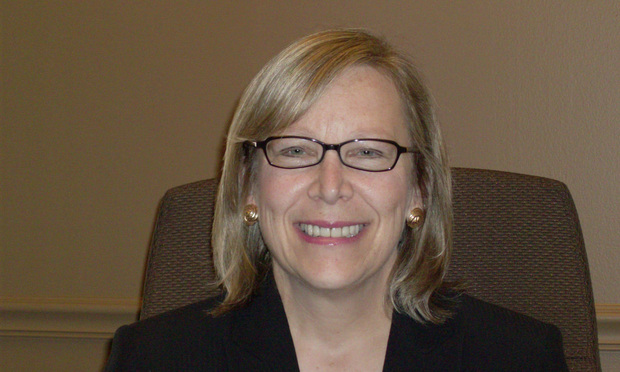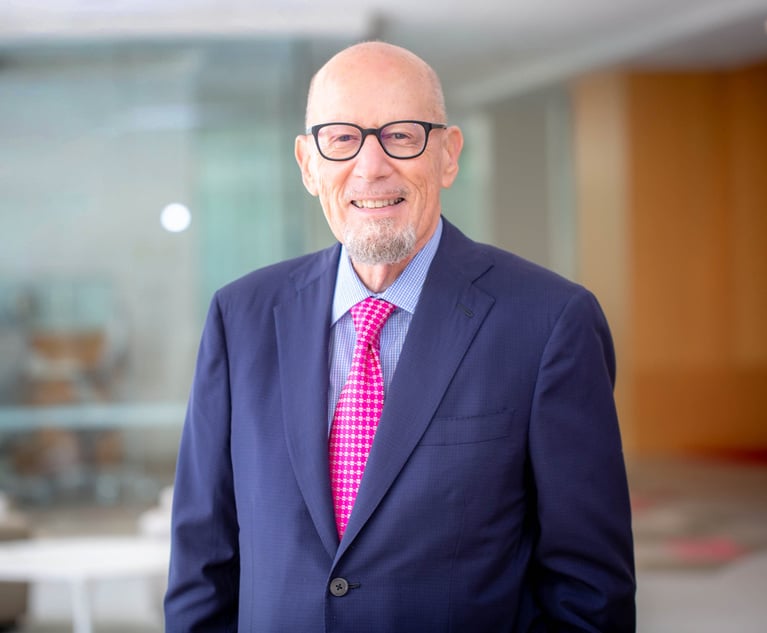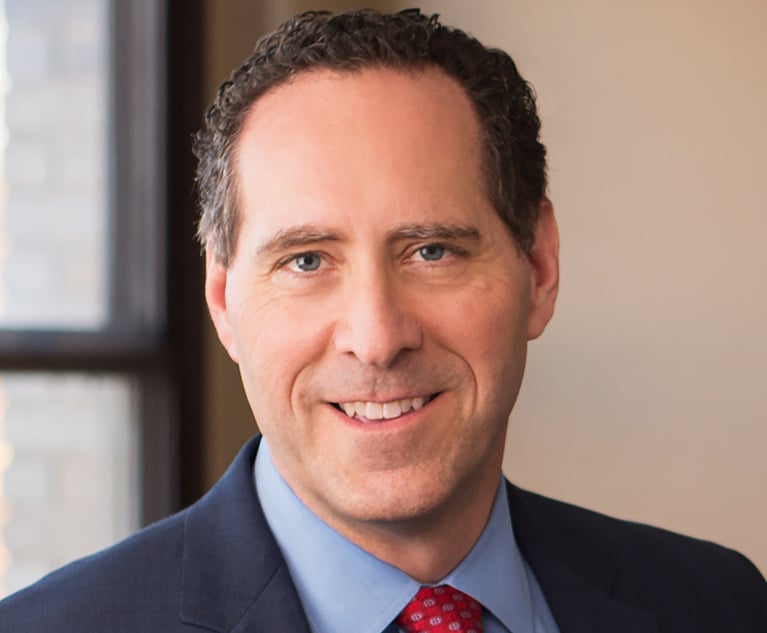New Defense Bar President Pushing to Add Value for Members
Harriet Anderson, an attorney with Robert Casey Jr. & Associates in Philadelphia, has been elected president of the Philadelphia Association of Defense Counsel, succeeding previous president Robert Cosgrove.
August 21, 2019 at 04:30 PM
6 minute read
 Harriet Anderson
Harriet Anderson
Harriet Anderson, an attorney with Robert Casey Jr. & Associates in Philadelphia, has been elected president of the Philadelphia Association of Defense Counsel, succeeding previous president Robert Cosgrove.
As president, Anderson is looking to strengthen the PADC by introducing new programs to improve diversity, inclusion, advocacy and skill enhancement and to continue the organization's advocacy on behalf of defendants.
The Legal spoke with Anderson about her goals for her upcoming tenure, as well as the challenges and opportunities she is expecting to encounter.
The following has been edited for style and clarity.
What challenges are you expecting to face as president?
I would say fitting everything into a single year of service. Right now, we have excellent ongoing initiatives developed by prior presidents Bob Cosgrove, Joe Cincotta and Dave Wolf, and a few new areas of focus.
Are there any new programs that are being worked on?
One of the stated goals of PADC is diversity and inclusion. Last year, under Bob Cosgrove, the PADC set up liaisons with GALLOP, the Hispanic Bar Association, Asian Pacific Bar Association and Barristers' bar association. We also presented new CLEs on "How to Overcome Adversity in Our Diverse Legal Community," formed the PADC Women's Initiative, with the inaugural CLE: "Leaders in the Courtroom: From the Trial Courts to the United States Supreme Court," chaired by Kathleen Wilkinson, Jennifer Coatsworth and Erin Siciliano.
This year we are looking to harness those efforts and create a new [diversity and inclusion] committee that focuses on CLE programming and community service programs. We will hold two standalone CLEs, focusing on legal issues facing women litigators and minorities in the courtroom and in the legal system, as well as host specific community service activities. All will be posted to the PADC website, www.philadefense.org, and we invite all members of the legal and judicial community to join with us in our efforts to champion D&I.
Other new programs involve enhancements to the ongoing CLE programming, with a focus on advocacy and skill enhancement. The CLE committee is led this year by Bill Ricci and Colleen Hayes. We invite the legal community and judiciary to join us for the CLEs, which run from September 2019 to May 2020, and feature such topics as "Amicus Initiatives" and "The Curious Case of the Orthopedic Surgeon Who Doesn't Operate." Luncheons are held on the third Tuesday of the month and are the "best-kept secret" value for CLEs from outstanding presenters at Center City restaurants. All the CLEs will be posted to the website and featured on the PADC LinkedIn page.
For community service programs, PADC members are again slated to serve the community at institutions such as Jane Addams Place and Ronald McDonald House, and through participation in mock trials with the Rendell Center for Civics and Civic Engagement. This fall we will join with the charity Alex's Lemonade Stand and invite defense counsel across the state, through the Pennsylvania Defense Institute, to join us for a statewide push to fund advances in childhood cancer. Check out our website for more details on PADC membership and community service initiatives.
Are there any legislative issues or policies that have you concerned?
Recently, on behalf of health care defendants, PADC, led by Dan Ferhat, filed comments with Pennsylvania's Civil Procedural Rules Committee opposing the proposed revocation of Rule of Civil Procedure 1006(a.1) and related medical malpractice venue rules.
These current rules limit venue in medical malpractice cases to the county where the care at issue was rendered. Our opposition is based on the fact that there was no data to support the conclusion that the rule is no longer needed.
What are you looking to accomplish during your tenure?
I have three goals: One is to add value to the PADC membership through providing enhanced resources to our members, and a dedicated platform to allow our members to showcase their considerable expertise.
We serve as a resource to our members, and a source of collegiality within the greater Philadelphia defense bar. We provide feedback on experts, analysis of pertinent shifts in case law, and assessment of changes to the Pa. R.E. and Pa.R.C.P. In addition we encourage members to provide CLEs and publish significant practice notes and articles pertaining to motion practice, trial skills and techniques, and case analysis. Check out our website for members' informative articles, and information on membership.
Two is to continue the PADC's strong tradition of service to the judiciary.
Recently, we were able to serve the judiciary as a timely point of contact to disseminate information to the bar regarding the [Philadelphia Court of Common Pleas] website shutdown. Former president Bob Cosgrove and Jennifer Coatsworth worked cooperatively with the court system and plaintiffs bar in that regard; in addition, PADC led initiatives with the plaintiffs bar and the judiciary through meetings with [former Philadelphia Court of Common Pleas President Judge Sheila] Woods-Skipper, [current President] Judge Idee Fox, [Administrative Judge Jacqueline] Allen and [Supervising Judge Arnold] New to address enhancements to electronic ID access to City Hall, and procedures for motions in limine sought by the bar.
The third is to remain in the forefront as a defense advocacy group.
PADC will continue to draft or join in important amicus briefs in conjunction with the Pennsylvania Defense Institute and the Defense Research Institute, through the important work of Terry Sachs, Jim Beck, Dan Ferhat, Lise Luborsky, Matt McColgan and many others, on issues important to protecting and advancing the interests of civil defendants. Briefs were filed on matters including unlisted resident driver exclusion, household vehicle exclusion involving use of motorcycle, admissibility of evidence regarding risks and complications in case alleging breach of standard of care, exercise of general personal jurisdiction over foreign corporations based on registration to do business in Pennsylvania, and applicability of attorney-client privilege and attorney work-product privilege to meetings with employees of corporate defendant.
Read More:
This content has been archived. It is available through our partners, LexisNexis® and Bloomberg Law.
To view this content, please continue to their sites.
Not a Lexis Subscriber?
Subscribe Now
Not a Bloomberg Law Subscriber?
Subscribe Now
NOT FOR REPRINT
© 2025 ALM Global, LLC, All Rights Reserved. Request academic re-use from www.copyright.com. All other uses, submit a request to [email protected]. For more information visit Asset & Logo Licensing.
You Might Like
View All
Cozen O'Connor's Bernard Nash Pioneered the Modern State AGs Practice. Now He's Hanging Up His Boots
6 minute read
Cohen Seglias Leader Discusses Growing From Construction Practice into Full-Service Law Firm


Trending Stories
- 1Litigators of the Week: A $630M Antitrust Settlement for Automotive Software Vendors—$140M More Than Alleged Overcharges
- 2Litigator of the Week Runners-Up and Shout-Outs
- 3Linklaters Hires Four Partners From Patterson Belknap
- 4Law Firms Expand Scope of Immigration Expertise, Amid Blitz of Trump Orders
- 5Latest Boutique Combination in Florida Continues Am Law 200 Merger Activity
Who Got The Work
J. Brugh Lower of Gibbons has entered an appearance for industrial equipment supplier Devco Corporation in a pending trademark infringement lawsuit. The suit, accusing the defendant of selling knock-off Graco products, was filed Dec. 18 in New Jersey District Court by Rivkin Radler on behalf of Graco Inc. and Graco Minnesota. The case, assigned to U.S. District Judge Zahid N. Quraishi, is 3:24-cv-11294, Graco Inc. et al v. Devco Corporation.
Who Got The Work
Rebecca Maller-Stein and Kent A. Yalowitz of Arnold & Porter Kaye Scholer have entered their appearances for Hanaco Venture Capital and its executives, Lior Prosor and David Frankel, in a pending securities lawsuit. The action, filed on Dec. 24 in New York Southern District Court by Zell, Aron & Co. on behalf of Goldeneye Advisors, accuses the defendants of negligently and fraudulently managing the plaintiff's $1 million investment. The case, assigned to U.S. District Judge Vernon S. Broderick, is 1:24-cv-09918, Goldeneye Advisors, LLC v. Hanaco Venture Capital, Ltd. et al.
Who Got The Work
Attorneys from A&O Shearman has stepped in as defense counsel for Toronto-Dominion Bank and other defendants in a pending securities class action. The suit, filed Dec. 11 in New York Southern District Court by Bleichmar Fonti & Auld, accuses the defendants of concealing the bank's 'pervasive' deficiencies in regards to its compliance with the Bank Secrecy Act and the quality of its anti-money laundering controls. The case, assigned to U.S. District Judge Arun Subramanian, is 1:24-cv-09445, Gonzalez v. The Toronto-Dominion Bank et al.
Who Got The Work
Crown Castle International, a Pennsylvania company providing shared communications infrastructure, has turned to Luke D. Wolf of Gordon Rees Scully Mansukhani to fend off a pending breach-of-contract lawsuit. The court action, filed Nov. 25 in Michigan Eastern District Court by Hooper Hathaway PC on behalf of The Town Residences LLC, accuses Crown Castle of failing to transfer approximately $30,000 in utility payments from T-Mobile in breach of a roof-top lease and assignment agreement. The case, assigned to U.S. District Judge Susan K. Declercq, is 2:24-cv-13131, The Town Residences LLC v. T-Mobile US, Inc. et al.
Who Got The Work
Wilfred P. Coronato and Daniel M. Schwartz of McCarter & English have stepped in as defense counsel to Electrolux Home Products Inc. in a pending product liability lawsuit. The court action, filed Nov. 26 in New York Eastern District Court by Poulos Lopiccolo PC and Nagel Rice LLP on behalf of David Stern, alleges that the defendant's refrigerators’ drawers and shelving repeatedly break and fall apart within months after purchase. The case, assigned to U.S. District Judge Joan M. Azrack, is 2:24-cv-08204, Stern v. Electrolux Home Products, Inc.
Featured Firms
Law Offices of Gary Martin Hays & Associates, P.C.
(470) 294-1674
Law Offices of Mark E. Salomone
(857) 444-6468
Smith & Hassler
(713) 739-1250





